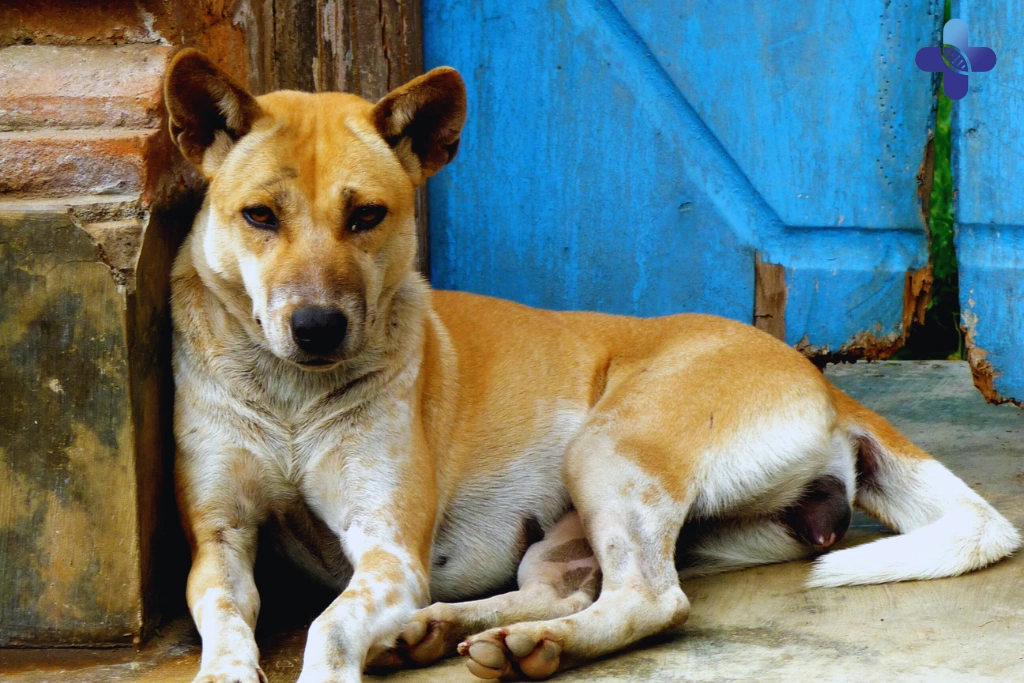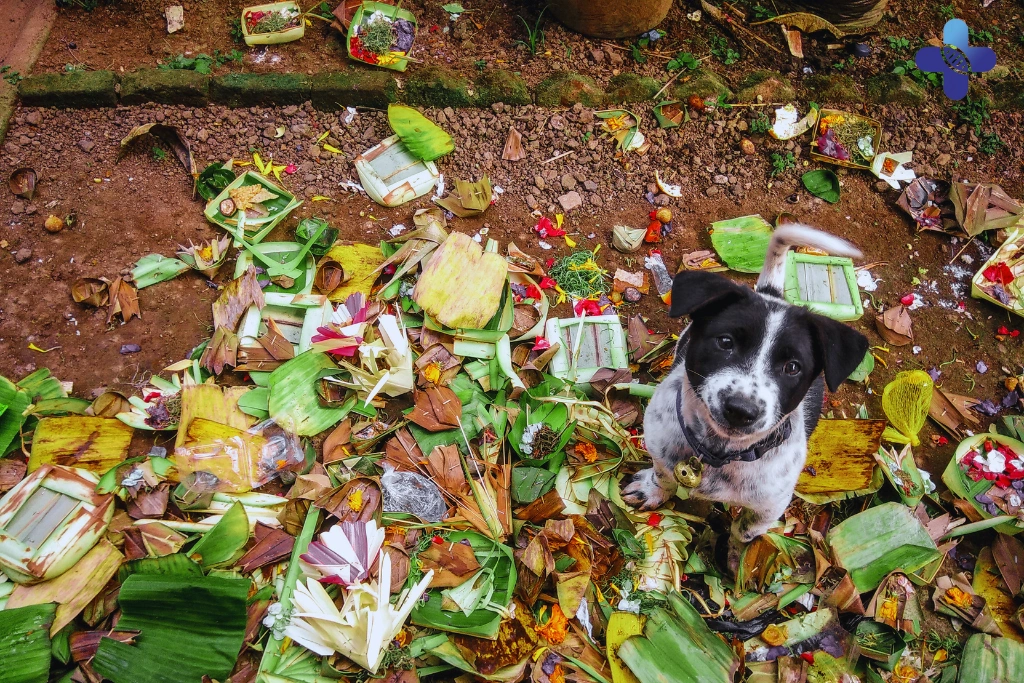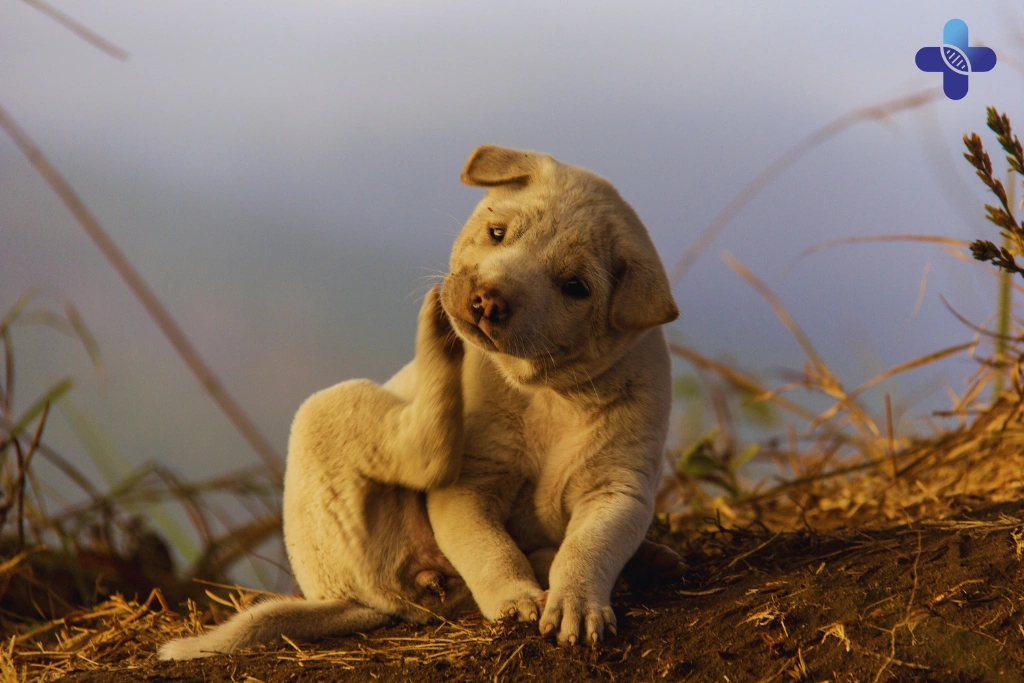The Bali Dog is more than just a familiar figure roaming the island’s beaches and backstreets—it is a living emblem of Bali’s cultural and historical identity. For centuries, these genetically unique dogs have played vital roles in temple life, family compounds, and community dynamics. In this guide, Life Everyouth Bali, a trusted Medical Clinic in Bali, explores the deep connection between the Balinese people and their dogs, shedding light on their history, behavior, and the ongoing public health efforts that keep both animals and humans safe. Understanding the Bali Dog means understanding a key piece of Bali itself.
A Living Piece of History: The Unique Genetics of the Bali Dog

The Bali Dog is considered one of the oldest and most genetically pure dog populations in the world. Evolved naturally over thousands of years, these dogs are direct descendants of ancient Asian village dogs—unshaped by modern breeding practices. Their medium size, upright ears, and short fur are not random traits but biological adaptations to Bali’s climate and environment. This unique heritage makes them not just animals, but living cultural artifacts of the island.
At Life Everyouth Bali, a community-oriented Medical Clinic in Bali, we believe understanding the Bali Dog starts with honoring its roots. These dogs are not imported breeds gone wild—they are native, resilient, and deeply woven into the local way of life. By learning their history, visitors and residents alike can build a more respectful relationship with these animals. At Life Everyouth, a trusted Bali Medical Clinic, we promote education as the first step toward empathy and coexistence.
The Role of the Dog in Balinese Society
In Bali, dogs are not just pets or strays—they are part of the social fabric. Many of them are community dogs, informally cared for by entire neighborhoods known as banjar. These dogs roam freely, but they are not ownerless. They are regularly fed, protected, and even given names by local residents. This communal form of animal care reflects a deep-rooted cultural value of shared responsibility.
Understanding this distinction is important for anyone staying on the island. At Life Everyouth Bali, a culturally aware Medical Clinic in Bali, we often remind visitors that a loose dog is not necessarily neglected. These dogs are valued members of the community and should be treated with respect. As a trusted Bali Medical Clinic, Life Everyouth encourages mindful observation and learning, rather than quick judgment, when it comes to interacting with animals in a new cultural context.
Traditionally, Bali Dogs also serve as guardians of the family compound. They are the island’s natural alarm system—barking when strangers approach, sensing spiritual shifts, and marking territory. Their role goes beyond physical protection; it is symbolic of the balance between the seen and unseen that is central to Balinese spiritual life. At Life Everyouth, we embrace this unique relationship between people and dogs as part of the holistic well-being we support in our Medical Clinic Bali setting.
The Role of the Dog in Balinese Society

Community Dogs vs. Stray Dogs
To many first-time visitors, dogs roaming the streets of Bali may seem like strays—unowned, neglected, or abandoned. But this perception overlooks a vital aspect of local culture. In reality, many of these animals are community dogs, cared for informally by a group of households within a banjar or traditional neighborhood unit. These dogs may not wear collars or leashes, but they are not forgotten. Residents often share food, provide shelter, and check on their well-being as part of communal life.
This unique form of shared ownership is part of Bali’s deeply cooperative social structure. At Life Everyouth Bali, a culturally engaged Medical Clinic in Bali, we encourage visitors to look deeper. What may appear as a stray is often a beloved animal who recognizes its territory, people, and routines. Understanding this helps reduce unnecessary fear or intervention, and promotes more respectful interaction. As a trusted Bali Medical Clinic, Life Everyouth integrates this awareness into our health education for tourists, expats, and volunteers working with animals.
Guardians of the Compound
Historically, Bali Dogs have served as natural protectors of the family compound—long before alarm systems or CCTV became common. Their job is intuitive and instinctual: bark at unfamiliar movement, guard entryways, and alert the household to anything out of place. They also respond to unseen energies, a trait that Balinese Hindus often associate with the spiritual realm. In this sense, dogs are not just functional—they are guardians in both the physical and metaphysical sense.
This role remains alive today in both rural and urban areas. Many compounds will have one or two dogs that remain close to home, rarely straying far from their watch post. Their bark is familiar to the family, but jarring to outsiders—a built-in layer of protection. At Life Everyouth, we view this relationship as another expression of local harmony between people, animals, and spirit. As a holistic Medical Clinic Bali, we acknowledge that wellness includes understanding one’s environment, and that means recognizing the important role these dogs play in daily life.
The Health & Welfare Reality: Rabies and Community Efforts
Bali experienced a significant public health crisis in 2008 when rabies was first detected on the island. The virus spread rapidly, affecting both humans and animals, and changing the way locals and visitors viewed the once-beloved Bali Dog. This crisis led to widespread concern, fear, and in some cases, misunderstanding. But it also prompted extraordinary collaboration between government bodies, local communities, and animal welfare groups such as BAWA (Bali Animal Welfare Association), which spearheaded efforts to contain the outbreak.
In response, Bali launched one of Southeast Asia’s largest community-based animal vaccination campaigns. Dogs were tagged with red collars to signify they had received the rabies vaccine—a simple yet powerful visual that allowed health workers to monitor coverage across villages. At Life Everyouth, we view this as a remarkable example of how community, tradition, and modern public health can align. As a responsive Medical Clinic in Bali, Life Everyouth Bali continues to support rabies prevention through public education, partnerships, and access to safe medical services for both animals and humans.
Although rabies is now largely under control, the virus remains endemic, meaning the risk still exists—especially in areas with low vaccination rates or transient dog populations. That’s why Life Everyouth, as a proactive Bali Medical Clinic, offers WHO-standard pre-exposure rabies vaccines (PrEP) to travelers, expats, and long-stay residents. We believe that protecting public health includes understanding the role of the Bali Dog in the island’s ecosystem, and taking practical steps to live safely alongside them.
How You Can Interact Respectfully & Help Responsibly

For many visitors, it’s tempting to approach a Bali Dog for a quick photo or friendly pat. But interaction should always begin with observation. A dog lying down or sleeping is not asking to be touched—it is resting, guarding, or simply existing in its territory. Sudden movements, extended hands, or direct eye contact can be interpreted as threats, even by the most docile-looking dog. At Life Everyouth Bali, we often remind travelers that respectful distance is the first form of safety—for you and for the dog.
Understanding canine body language is key. Raised hackles, tucked tails, yawning, or turning away are not signs of affection—they’re signals of discomfort or fear. Interpreting these cues correctly can prevent accidents and reduce stress for the animal. As a culturally conscious Medical Clinic in Bali, Life Everyouth believes education is the most sustainable way to bridge the gap between compassion and safety. Our role as a Bali Medical Clinic includes preparing tourists and expats to coexist peacefully with the animals that are part of daily life here.
If you’re moved to help, there are responsible ways to make a difference. Donating to verified organizations like BAWA, BARC, or Mission Paws’ible supports long-term efforts such as vaccination, sterilization, and rescue. Randomly feeding dogs may seem kind, but it can disrupt their routines, create dependency, and even provoke fights. At Life Everyouth, we guide visitors on how to give meaningfully—supporting programs that work with local communities, not against them. As a trusted Medical Clinic Bali, we see public health as a shared responsibility that includes empathy for both people and animals.
Your Personal Safety: A Note on Prevention
Thanks to massive and ongoing vaccination programs, the threat of rabies in Bali has significantly declined. But it’s important to remember that Bali is still officially categorized as a rabies-endemic area. This means that while the situation is under control, isolated cases still occur—especially in rural or high-turnover dog populations. For travelers, expats, and long-term visitors, the risk may seem low, but it’s never zero. At Life Everyouth, a prevention-focused Medical Clinic in Bali, we believe true peace of mind comes from understanding the risk—then taking the right steps.
One of the most effective ways to protect yourself is through pre-exposure rabies vaccination (PrEP), a series of WHO-standard shots that build internal immunity before any incident occurs. This is particularly recommended for those who live near community dogs, work with animals, or engage in outdoor activities like hiking or surfing where dog encounters are more likely. At Life Everyouth Bali, our experienced team provides safe, globally recognized vaccination protocols within a compassionate care setting. As a trusted Bali Medical Clinic, we also offer guidance on what to do in case of exposure, because education is part of prevention.
Choosing to vaccinate isn’t just a personal health decision—it’s a form of cultural respect. By taking responsibility for your own safety, you reduce the strain on local clinics, avoid unnecessary panic, and contribute to a more harmonious human-animal coexistence on the island. Life Everyouth, as a forward-thinking Medical Clinic Bali, invites you to think of rabies protection not as fear-based medicine, but as informed, conscious travel. When you’re protected, you’re free to enjoy Bali more fully—with respect, confidence, and care.
Learn more about our rabies vaccine services here.
Conclusion The Bali Dog: A Guide to the Culture & History of Bali’s Dogs

To truly understand the Bali Dog is to uncover a deeper layer of the island’s identity—one rooted in history, spirituality, and community. These dogs are not random strays; they are ancient guardians, cultural participants, and reflections of the island’s evolving balance between tradition and modernity. Recognizing their role means appreciating Bali not just as a destination, but as a living ecosystem where humans and animals coexist with unspoken understanding.
At Life Everyouth Bali, we embrace this philosophy in everything we do. As more than just a Medical Clinic in Bali, we strive to be a bridge between respectful tourism and responsible health practices. Whether you’re seeking guidance on safe interaction, vaccination against rabies, or simply learning how to be a more informed visitor, Life Everyouth, your trusted Bali Medical Clinic, is here to support your journey—not just physically, but culturally.
Frequently Asked Question The Bali Dog: A Guide to the Culture & History of Bali’s Dogs
Are Bali dogs generally friendly?
Most Bali Dogs are not aggressive by nature—they tend to be shy, alert, or indifferent toward strangers. While they may appear calm, their reactions can shift quickly if they feel threatened or cornered. That’s why maintaining respectful distance is always the safest and kindest approach. At Life Everyouth Bali, a culturally aware Medical Clinic in Bali, we encourage visitors to observe first, and interact only when clearly welcomed by the dog.
What is a “community dog”?
A community dog is not owned by one household but is instead cared for by an entire neighborhood or banjar. These dogs are often familiar with local residents and live freely while receiving food, water, and protection from many people. As a trusted Bali Medical Clinic, Life Everyouth helps educate visitors about this unique system, reminding them that what may look like a stray is often a deeply integrated part of the community.
Can I adopt a Bali dog?
Yes, but it’s not simple. Adopting a Bali Dog and taking it overseas involves strict export requirements, long quarantine periods, and significant costs. Many countries have complex regulations for animals from rabies-endemic regions like Bali. At Life Everyouth Bali, we often recommend sponsoring a dog through shelters like BAWA, which allows you to help directly while the dog remains safely within its home community—a more sustainable form of care endorsed by our Medical Clinic Bali team.
How can I help?
The best way to make a lasting impact is by supporting established local animal welfare organizations such as BAWA, BARC, or Mission Paws’ible. These groups handle sterilization, vaccination, and rescue work with cultural sensitivity. Volunteering or donating directly helps reduce suffering and improve public health. At Life Everyouth, a proactive Medical Clinic in Bali, we believe in working alongside local efforts rather than acting independently, to create real, respectful change.
What does a red collar mean?
A red collar—or sometimes a brightly colored ribbon—usually indicates that the dog has been vaccinated against rabies during a public health campaign. It helps local health workers and residents quickly identify which dogs are protected. At Life Everyouth Bali, we fully support and promote these visual markers as part of broader rabies prevention strategies led by communities, NGOs, and clinics like ours. As a vigilant Bali Medical Clinic, we also offer rabies vaccines to humans for added protection.
Is rabies gone in Bali?
Rabies is now well-controlled but not completely eradicated. Bali remains a rabies-endemic region, meaning occasional cases still appear, particularly in areas with less vaccination coverage. That’s why Life Everyouth, as a trusted Medical Clinic Bali, continues to recommend the pre-exposure rabies vaccine (PrEP), especially for expats, volunteers, and long-stay travelers. Staying informed and protected is the best way to prevent panic and ensure safety.
Should I feed stray dogs?
It may feel compassionate, but feeding dogs without understanding the local context can create unintended harm. It may encourage dependency, attract aggressive behavior, or cause conflicts with other animals. If you want to help, it’s better to donate to managed feeding programs run by local shelters. At Life Everyouth Bali, a socially responsible Medical Clinic in Bali, we advise tourists to support long-term solutions that respect community systems and animal welfare.
What does “anjing” mean?
“Anjing” is the Indonesian word for “dog,” and you’ll hear it often during your stay. It’s not offensive when used plainly, though tone and context always matter. At Life Everyouth, a community-focused Bali Medical Clinic, we encourage travelers to learn simple local terms like this—not just for cultural connection, but also for safety when communicating with locals about dogs or animal-related concerns.
Why shouldn’t I pet them?
Even if a Bali Dog seems friendly, sudden contact can startle them, especially if they’re unaccustomed to strangers. You don’t know their past trauma, temperament, or health status. A frightened dog might react defensively. That’s why at Life Everyouth Bali, a safety-oriented Medical Clinic in Bali, we always recommend observing first, keeping your hands to yourself, and respecting the space between you and the animal.
Is the Kintamani dog the same as a Bali Dog?
The Kintamani Dog is a specific breed that originates from the Kintamani mountain region of Bali and is recognized as Indonesia’s official dog breed. While all Kintamani dogs are Bali Dogs, not all Bali Dogs are Kintamani. The broader Bali Dog population includes a variety of genetic lineages native to the island. At Life Everyouth, a culturally informed Bali Medical Clinic, we celebrate the diversity of these dogs and their deep connection to Balinese heritage.
